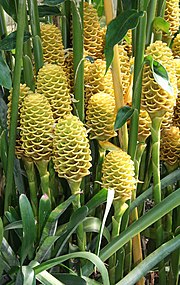| Habit | bulbous
| |
|---|---|---|
| Height: | ⇕ | 5 ft"ft" can not be assigned to a declared number type with value 5. to 7 ft"ft" can not be assigned to a declared number type with value 7. |
| Width: | ⇔ | 3 ft"ft" can not be assigned to a declared number type with value 3. |
| Lifespan: | ⌛ | perennial |
| Origin: | ✈ | Malaysia |
| Bloom: | ❀ | early summer, mid summer, late summer |
| Water: | ◍ | moist, moderate |
|---|---|---|
| Features: | ✓ | flowers, foliage |
| USDA Zones: | 9 to 11 |
|
Zingiber > |
Read about Zingiber spectabile in the Standard Cyclopedia of Horticulture
|
|---|
|
Zingiber spectabile, Griff. Leafy sts. 6 ft. or more high, robust: lvs. subsessile, oblong-lanceolate, acuminate at base, obscurely green above, paler pubescent beneath, 8-12 x 3 1/2 in.: spike 8-12 in. long, a little over 2 in. diam., laxly cylindrical, apex rounded; bracts yellow, finally scarlet, apex obtuse: corolla yellowish white, dorsal lobe deep concave, broad, anterior narrower, linear-lanceolate, lip obovate, emarginate, 2-lobed, lemon-yellow, apex almost black, lateral lobes half as long as midlobe, ovate. Malay Penins. B.M. 7967.
|
Zingiber spectabile (maybe syn. with Z. spectabilis) Flowers (or rather the inflorescence) are long cylinders, with yellow bracts that turn a scarlet red over time. The actual flowers come out of these bracts in late summer, and are small, whitish-cream, with a double lobed dark purple lip which has yellow spots. Deep green leaves are long, with a lighter green downy on the undersides.
- More information about this species can be found on the genus page.
Cultivation
Propagation
Pests and diseases
Cultivars
Gallery
References
- Standard Cyclopedia of Horticulture, by L. H. Bailey, MacMillan Co., 1963
- Flora: The Gardener's Bible, by Sean Hogan. Global Book Publishing, 2003. ISBN 0881925381
External links
- w:Zingiber spectabile. Some of the material on this page may be from Wikipedia, under the Creative Commons license.
- Zingiber spectabile QR Code (Size 50, 100, 200, 500)
